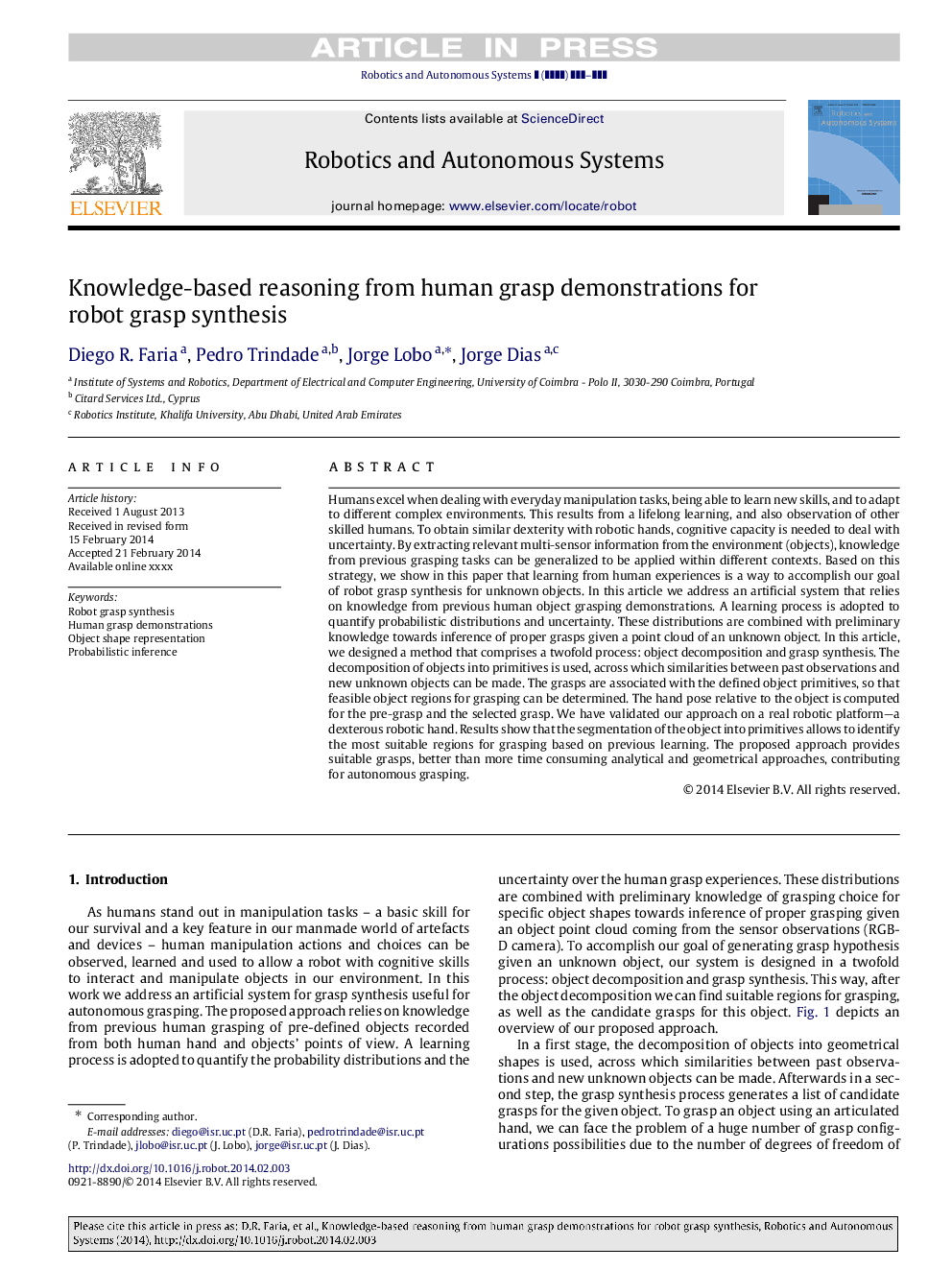| کد مقاله | کد نشریه | سال انتشار | مقاله انگلیسی | نسخه تمام متن |
|---|---|---|---|---|
| 10327021 | 680489 | 2014 | 24 صفحه PDF | دانلود رایگان |
عنوان انگلیسی مقاله ISI
Knowledge-based reasoning from human grasp demonstrations for robot grasp synthesis
ترجمه فارسی عنوان
استدلال مبتنی بر دانش از تظاهرات درک انسان برای سنتز گرفتن روبات
دانلود مقاله + سفارش ترجمه
دانلود مقاله ISI انگلیسی
رایگان برای ایرانیان
کلمات کلیدی
ربات درک سنتز، تظاهرات درک انسانی، نمای شکل شی، استنتاج احتمالاتی،
ترجمه چکیده
انسان در هنگام برخورد با وظایف دستکاری روزمره، توانایی یادگیری مهارت های جدید و انطباق با محیط های پیچیده پیچیده را برتری می دهد. این نتیجه از یادگیری مادام العمر و همچنین مشاهده سایر افراد ماهر است. برای دستیابی به مهارت های مشابه با دست های روباتیک، برای حل و فصل عدم اطمینان، ظرفیت شناختی مورد نیاز است. با استخراج اطلاعات مربوط به چند سنسور از محیط (اشیاء)، دانش از قبول وظایف قبلی می تواند تعمیم داده شود که در زمینه های مختلف استفاده شود. بر اساس این استراتژی، در این مقاله نشان داده شده است که یادگیری از تجربیات انسانی راهی برای رسیدن به هدف ما از سنتز درک روبات برای اشیاء ناشناخته است. در این مقاله، ما به یک سیستم مصنوعی که بر دانش از تظاهرات قبیله ای انسانی پیشین مبتنی است متکی است. یک فرآیند یادگیری برای تعیین توزیع احتمالاتی و عدم اطمینان به کار رفته است. این توزیع ها با دانش اولیه به منظور نتیجه گیری از درک مناسب با توجه به ابر نقطه یک شی ناشناخته ترکیب می شوند. در این مقاله، ما یک روش متشکل از یک فرآیند دوگانه را ارائه دادیم: تجزیه شئ و سنتز درک. تجزیه اشیاء به ابتدایی ها مورد استفاده قرار می گیرد، که در آن شباهت بین مشاهدات گذشته و اشیاء ناشناخته جدید می تواند ساخته شود. چسب ها با ابتدای شیء تعریف شده مرتبط هستند، به طوری که مناطق شیء امکان پذیر می توانند تعیین شوند. دست مطرح شده نسبت به جسم برای پیش گرفتن و محاسبه انتخاب شده محاسبه شده است. ما رویکرد ما را در یک پلت فرم روباتیک واقعی، یک دست رباتیک لجباز، معتبر کرده ایم. نتایج نشان می دهد که تقسیم بندی شی به ابتدایی ها امکان شناسایی مناسب ترین مناطق را برای درک بر اساس یادگیری قبلی فراهم می کند. رویکرد پیشنهادی، چشمانداز مناسب را بهتر از روشهای تحلیلی و هندسی بیشتر وقت میگیرد و کمک میکند تا بتواند خود را درک کند.
موضوعات مرتبط
مهندسی و علوم پایه
مهندسی کامپیوتر
هوش مصنوعی
چکیده انگلیسی
Humans excel when dealing with everyday manipulation tasks, being able to learn new skills, and to adapt to different complex environments. This results from a lifelong learning, and also observation of other skilled humans. To obtain similar dexterity with robotic hands, cognitive capacity is needed to deal with uncertainty. By extracting relevant multi-sensor information from the environment (objects), knowledge from previous grasping tasks can be generalized to be applied within different contexts. Based on this strategy, we show in this paper that learning from human experiences is a way to accomplish our goal of robot grasp synthesis for unknown objects. In this article we address an artificial system that relies on knowledge from previous human object grasping demonstrations. A learning process is adopted to quantify probabilistic distributions and uncertainty. These distributions are combined with preliminary knowledge towards inference of proper grasps given a point cloud of an unknown object. In this article, we designed a method that comprises a twofold process: object decomposition and grasp synthesis. The decomposition of objects into primitives is used, across which similarities between past observations and new unknown objects can be made. The grasps are associated with the defined object primitives, so that feasible object regions for grasping can be determined. The hand pose relative to the object is computed for the pre-grasp and the selected grasp. We have validated our approach on a real robotic platform-a dexterous robotic hand. Results show that the segmentation of the object into primitives allows to identify the most suitable regions for grasping based on previous learning. The proposed approach provides suitable grasps, better than more time consuming analytical and geometrical approaches, contributing for autonomous grasping.
ناشر
Database: Elsevier - ScienceDirect (ساینس دایرکت)
Journal: Robotics and Autonomous Systems - Volume 62, Issue 6, June 2014, Pages 794-817
Journal: Robotics and Autonomous Systems - Volume 62, Issue 6, June 2014, Pages 794-817
نویسندگان
Diego R. Faria, Pedro Trindade, Jorge Lobo, Jorge Dias,
